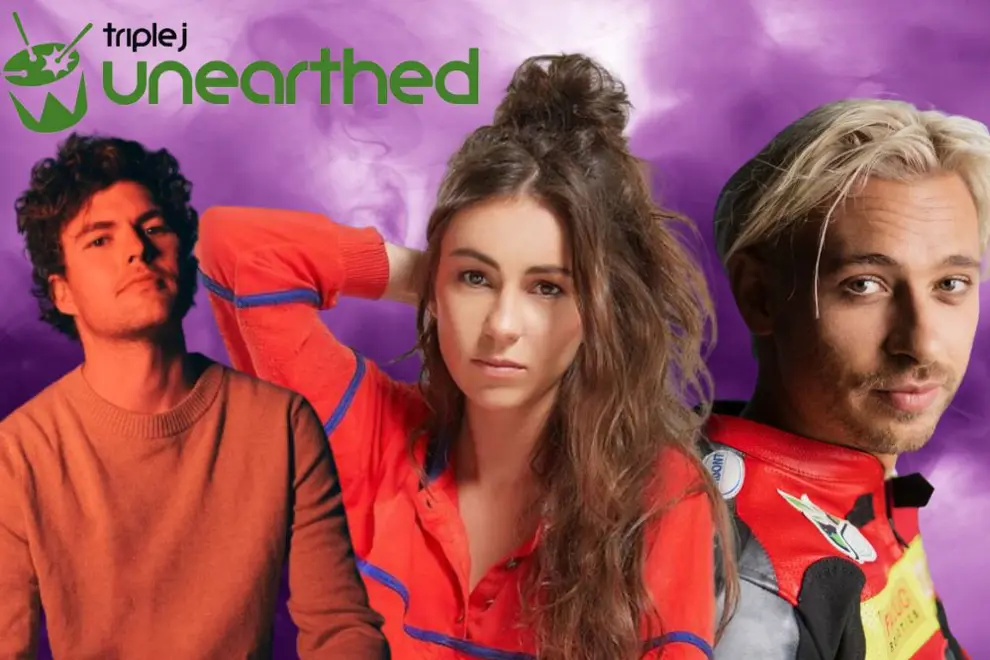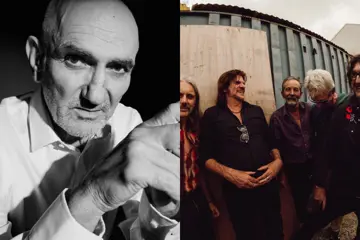Flume. Ball Park Music. Vance Joy. Amy Shark. Gang of Youths. The list of iconic Australian musicians discovered on triple j Unearthed goes on and on.
But the question remains: why?
ABC’s 24/7 digital radio station plays songs solely by unsigned and independent musicians – giving little bands a chance to make it big.
We sat down with a few of these musicians for a chat about what Unearthed means to them – warts and all.
Zoë Hilditch, half of electro-pop duo WIIGZ and the artist behind the experimental sounds of ZOBOT, couldn’t speak higher of Unearthed, citing the support she received after uploading WIIGZ’s first single, Red Hot Pants, to the platform: “Unearthed was so beneficial for us. Like, we put out our first single and there was just so much support there. That really encouraged us to put out another song, and then there was even more support.”
Unearthed is unique to other radio stations. Its digital format allows for hosts, artists, and listeners alike to review songs on the platform. Songs with higher listens and reviews can end up on the homepage of the station, a coveted position.
“Most singles that go up have a review,” Hilditch said. “You always see one of the triple j or Unearthed people writing a review, and I think that’s awesome because it means everyone gets heard.”
Music producer and audio engineer Matheus Chaves also noted how vigilant Unearthed hosts are in reviewing songs on the platform.
Don't miss a beat with our FREE daily newsletter
“They seem to review every song that gets put up, no matter what level you’re at,” he said. “It’s like an open door to all artists. You don’t have to have all these levels of recognition to be heard.”
This sentiment rings true for Kieran Stevenson, a small artist reminiscent of HAIM and ‘80s pop. His new song, If You Could Read My Mind, received a 4-star review by triple j radio host Ash McGregor, who called it “a shimmery summer dance anthem”.
The review gave him the boost to get played on triple j’s main radio three weekends in a row.
“Jess Perkins, who played me on Weekend Arvos, I feel like she said she heard it via Unearthed, or Ash McGregor’s review on Unearthed,” Stevenson said. “Being played [on radio] was different. So different. It really upped my listeners drastically.”
Uploading your song to Unearthed is considered the norm in the independent music community. Though not everyone sees immediate success on the platform, or success in general, the chance at fame and recognition is too enticing to resist.
Denis Janse, half of Brisbane indie-pop duo LOVELOVELOVE, explained it best. “It’s providing a platform that, without it, it would just be so hard to find yourself on radio, because there isn’t another market for independent music,” he said.
“They’re playing your music on radio, and though it’s not live-to-air radio, it’s still live, and it’s still radio.”
LOVELOVELOVE’s chill tunes have been a staple on Unearthed airwaves lately, giving the band enough traction to be played on triple j’s main station, as well as on MTV’s Upload.
“What is valued in Australia by stakeholders is triple j play and triple j notoriety,” Janse said. “It sort of screams universal credibility. You’re being backed by the biggest independent music curator in the country.”
This pipeline effect is intentional, as seen by the ABC’s statement in the Commonwealth’s Report on the Inquiry into the Australian Music Industry in 2018: “Triple J Unearthed empowers Australian artists and provides a pathway, not only to airplay on ABC stations, but to the wider Australian and global audiences.”
Being played on Unearthed can be huge when applying for festivals, playlists, grants, or events, providing opportunities artists would be unlikely to reach otherwise. “Any time you apply for anything, they ask you, ‘What are your accolades in Australia or overseas? What are things that have happened that point to you being a valuable artist?’ And what Unearthed has done is given us credibility and accolade,” Janse explained.
“If you’re being played by triple j, and you’ve got plenty of good reviews, and you’re being played on rotation, it paints a picture. In the industry, I would say that’s way more measurable than how many people listen to you,” he said.
The value placed on radio play over listenership is a good thing for artists on Unearthed. Unfortunately, popularity on the platform doesn’t necessarily translate into gaining more streaming on other platforms like Spotify or Apple Music, according to Samuel Ayling, the singer and songwriter behind This New Light.
“I think the conversion rate from radio to Spotify listens is pretty low, and even more so for Unearthed,” he said.
“You put out music and you want to tick all those boxes. You want to get played on triple j or triple j Unearthed. You want to get on a Spotify playlist. All these things, they’re good, and they don’t always, like, help the project, but they’re good little badges to stick on your vest.”
Janse shared a similar view. “Being on Unearthed, the improvement is very minor in terms of listeners,” he said. “It’s more valuable for you in the industry sense than the listening sense.”
But despite this disheartening reality, artists still view Unearthed as an asset for their music. The station is designed for new and independent artists to find new fans – or rather, fans to find new artists. Chaves described the station as its own “niche little Spotify”.
“The people that are going on Unearthed are actually seeking out new music that no one’s heard before,” he said. “It’s able to connect emerging artists with new fans, because those fans are looking for new music.”
Publicist and manager Jonny Blackwell had the same perspective, saying that Unearthed is “a great platform to get exposure”.
It’s not just being played or reviewed that makes Unearthed the go-to for small artists. The platform often runs competitions where artists can submit their songs to win.
One of these competitions is #UnfinishedFlume, where artists incorporate unfinished samples from Flume himself into their own songs. Hilditch threw her song Fancy Car into the running, and, to her delight, became overwhelmed with positive reviews, landing her a spot as the featured review of the day on Unearthed, and causing her to become one of the finalists in the competition.
“I think it’s sick how triple j just do random competitions like this, because it creates a bit of a community,” she said. “I’ve noticed lots of people who have also done it have been writing reviews, and vice versa. It’s cool.”
Though competitions like #UnfinishedFlume might play into the ever-present myth of the “triple j Sound”, where songs on the station are accused of all sounding the same, Chaves isn’t so sure that triple j is the culprit.
“I think there’s definitely ‘a sound’ but I think maybe it doesn’t reflect triple j necessarily. Maybe it’s more like a culture thing - Australian culture,” he said. “Usually, the storytelling is quite straightforward. It’s different to American music. I think the vocals are a bit more laid back and spoken.”

And when he says that Unearthed is a reflection of Australian culture, he means ALL Australian culture. Unearthed has been highly praised for their inclusion and diversity on the platform. Almost every interviewee mentioned the inclusivity of the platform without any prompting.
“They’re actively looking for new people, particularly in the marginalised spaces,” Janse said. “Triple J is always going to be slightly more left-wing as well, so they’re always looking at how to promote and give a voice to people in the progressive space.”
Unearthed’s executive producer Tommy Faith explained how this approach works at the station.
“Diversity is a constant consideration across Unearthed programming. It is factored into everything from our homepage placements, radio playlisting, the presenters we have on-air and even the voices you hear across radio promos,” he said.
“This spans everything from cultural diversity to LGBTQI+ representation, gender balance to ensuring a geographical balance across the whole country.”
In a world as divided as ours, it is so important to have a space where marginalised voices can be recognised and uplifted. Even the smallest minorities can have their own say on Unearthed.
This is most evident in Unearthed’s brand new competition, Unearthed High, where high school students are encouraged to upload their original music to Unearthed for the chance to win triple j’s full support in recording, mixing, and mastering their next song.
Not only does this encourage Australia’s younger musicians to finetune their craft, but the additional Unearthed High Indigenous Initiative gives First Nations entrants the chance to win a songwriting workshop at their school.
Faith explained: “The Unearthed High Indigenous Initiative is a really special part of Unearthed High that's seen unknown names become prominent within Australian music. First Nations artists like Tia Gostelow, KAYPS and Becca Hatch all got their first major opportunity through the Unearthed High Indigenous Initiative.”
These kinds of initiatives and competitions run by Unearthed prioritise providing space for new musicians from every background to be heard.
“Artists that might not have the necessary team to get their music in the right professional ears have the same opportunity as those with a massive team around them on Unearthed, so we're able to discover emerging artists and help them take their craft to the next level while finding an audience,” Faith said.
Chaves agreed. “It’s definitely necessary to have this kind of space, where it’s a niche, underground, kind of listening platform.”
For smaller unsigned artists like Stevenson, sometimes “niche” and “underground” is the only option. “There are not a lot of opportunities outside of triple j and Unearthed when it comes to the level of influence that you need to get a leg up,” he said. “It’s such a make-or-break thing, and it can be so huge.”
Basically, for independent Aussie artists, Hilditch phrased it best: “Unearthed hasn’t influenced the music industry, it just kind of feels like it is the music industry.”

















